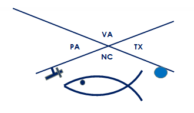Fort Bragg iSportsman:
Great site for official information on fishing, local weather and permits: https://bragg.isportsman.net/
Fishing on Fort Bragg NC
The lakes on Fort Bragg present a difficult challenge for fishermen because they get a great deal of pressure. To be successful you need to get to fish that are not under so much pressure. On Fort Bragg, its almost impossible. A kayak can go a long way but even then its tough to catch any fish after mid July.
The fish are there but they get tougher to catch after June. I’ve had days in the summer with double digit misses. Fall brings cooler temperatures and by October catching fish gets easier.
Spring is the best season for panfish, bass and crappie. The last 30 minutes of light at any of the lakes will produce action. Day break through 1000 in the morning is good but the earlier in the season, fish can get caught throughout the day.
Most fish are under 15 inches but on occasion the big ones make a mistake and get caught. Over the course of a year, I caught three large bass on Fort Bragg. I fished a lot that year to include a few times during the work week and most of Saturday and Sunday after lunch.
McKellars Lodge
https://bragg.armymwr.com/programs/mckellars-lodge
Overview of Fort Bragg Fisheries Management
https://bragg.isportsman.net/fishing.aspx
The goal of fisheries management at Fort Bragg is to provide a better than average chance of catching a better than average fish. Our management plan is implemented to support the soldier, as well as family members, former service members, retirees, and civilians. Population surveys, habitat enhancement (placement of fish structures, both natural and artificial), fish stocking, liming and fertilizing, supplemental feeding, and aquatic weed control are just some of the projects performed annually to enhance the fisheries on the installation. The lakes on Fort Bragg are divided into three categories: Intensively Managed, Managed, and Intensively Managed Catfish lakes.
Intensively Managed Lakes
Kiest, Simmons, Boundary Line, McFayden, Hurley, and Holland lakes fall into the Intensively Managed category on Fort Bragg. Special management practices are utilized on these lakes to increase the carrying capacity for each impoundment. These lakes are managed for largemouth bass, bluegill, redear sunfish, and channel catfish. Some of these lakes also contain black crappie. From spring through fall, all of these lakes (except McFayden) are fertilized to maintain an algae bloom. They are limed periodically with one to three tons per surface acre with crushed dolomitic limestone. Liming increases the rate of decomposition of organic material and stimulates the release of nutrients from sediments which helps the algae bloom. Liming also improves water quality by raising the pH and buffering the daily pH fluctuation.
Managed Lakes
Croatan, Quail, Deer Pen, *Overhills, Big Muddy, Little Muddy, Texas, MacArthur, Smith, Mott, and Lindsay lakes fall into this category. These lakes are not enhanced by special management practices like fertilizing and liming; mainly due to their size and/or high water exchange rates. Fish populations are respectable in these lakes, but are usually sustained at natural levels. These lakes are not normally given any supplemental stockings, although survey data occasionally indicate the benefit of an additive stocking; the species compositions of these lakes are usually what one would expect to find in a “wild” impoundment. The majority of fish sampled during fisheries surveys on these lakes are species that are not typically sought after by anglers, such as lake chubsuckers, chain pickerels (jacks), and warmouths. That being said good fishing can still be had, as largemouth bass and bluegills are also present; albeit at a lower relative abundance than in the intensively managed ponds.
* Overhills dam breached in October 2016 after Hurricane Matthew. There are no plans in the queue to repair it.
Intensively Managed Catfish Lakes
Lower McKellar’s, Wyatt, Mossgeill*, and Andrews Church* lakes are the Intensively Managed Catfish lakes on Bragg. They are managed strictly for channel catfish. These lakes are stocked every year at high stocking rates (usually ~500 12-16″ fish per acre). Other fish species besides channel catfish are present in these lakes, but they are not desired; primarily because they compete with catfish for food, as well as predate any catfish fry that may hatch during the year. Larger-sized catfish are stocked to reduce predation mortality from largemouth bass or chain pickerels. Although not out of the question, natural reproduction of channel catfish has not been documented on Fort Bragg in recent years. This phenomenon is common and usually expected for channel catfish in small bodies of water.
 bluecordfishermen
bluecordfishermen 
